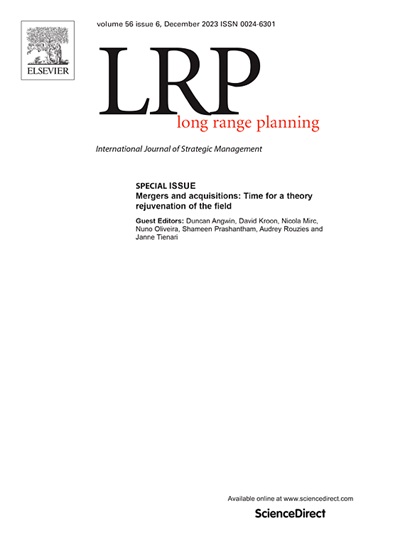Executive training as a turning point in strategic renewal processes☆
IF 6.3
2区 管理学
Q1 BUSINESS
引用次数: 0
Abstract
Turning points—periods when firms shift their strategic trajectory—are central to the literature on strategic renewal. This study advances theoretical understanding by examining how executive training, a potential component of turning points, serves as a platform for constructing future trajectories. We investigate how such programs catalyze renewal by enabling firms to transition from one historical trajectory to another. Through an in-depth qualitative analysis of corporate archives, we find that the transformative effects of executive training hinge on power dynamics among organizational coalitions and the program's ability to challenge entrenched trajectories while inspiring new possibilities. Executive training creates temporal spaces where envisioning a future strategic direction requires both stigmatizing the existing trajectory and conceptualizing an alternative path forward. These programs are not neutral. Instead, they are shaped by power struggles that influence their content and objectives. Executives can strategically leverage training to steer broader renewal efforts, reframe perceptions of the firm's past, and articulate a vision for its future. In this way, executive training emerges as a critical tool not only for capability development but also for driving fundamental strategic transformations.
高管培训是战略更新过程中的转折点
转折点——公司改变战略轨迹的时期——是战略更新文献的核心。本研究通过考察高管培训(转折点的潜在组成部分)如何作为构建未来轨迹的平台,来推进理论理解。我们研究这些项目如何通过使企业从一个历史轨迹过渡到另一个历史轨迹来催化更新。通过对企业档案的深入定性分析,我们发现高管培训的变革效果取决于组织联盟之间的权力动态,以及该项目在激发新可能性的同时挑战根深蒂固轨迹的能力。高管培训创造了时间空间,在这个空间中,设想未来的战略方向既需要对现有轨迹进行污名化,也需要概念化另一种前进道路。这些程序不是中立的。相反,它们受到影响其内容和目标的权力斗争的影响。高管们可以战略性地利用培训来引导更广泛的更新工作,重塑对公司过去的看法,并阐明对未来的愿景。通过这种方式,高管培训不仅成为能力发展的关键工具,而且成为推动基本战略转变的关键工具。
本文章由计算机程序翻译,如有差异,请以英文原文为准。
求助全文
约1分钟内获得全文
求助全文
来源期刊

Long Range Planning
Multiple-
CiteScore
13.00
自引率
7.10%
发文量
75
期刊介绍:
Long Range Planning (LRP) is an internationally renowned journal specializing in the field of strategic management. Since its establishment in 1968, the journal has consistently published original research, garnering a strong reputation among academics. LRP actively encourages the submission of articles that involve empirical research and theoretical perspectives, including studies that provide critical assessments and analysis of the current state of knowledge in crucial strategic areas. The primary user base of LRP primarily comprises individuals from academic backgrounds, with the journal playing a dual role within this community. Firstly, it serves as a platform for the dissemination of research findings among academic researchers. Secondly, it serves as a channel for the transmission of ideas that can be effectively utilized in educational settings. The articles published in LRP cater to a diverse audience, including practicing managers and students in professional programs. While some articles may focus on practical applications, others may primarily target academic researchers. LRP adopts an inclusive approach to empirical research, accepting studies that draw on various methodologies such as primary survey data, archival data, case studies, and recognized approaches to data collection.
 求助内容:
求助内容: 应助结果提醒方式:
应助结果提醒方式:


